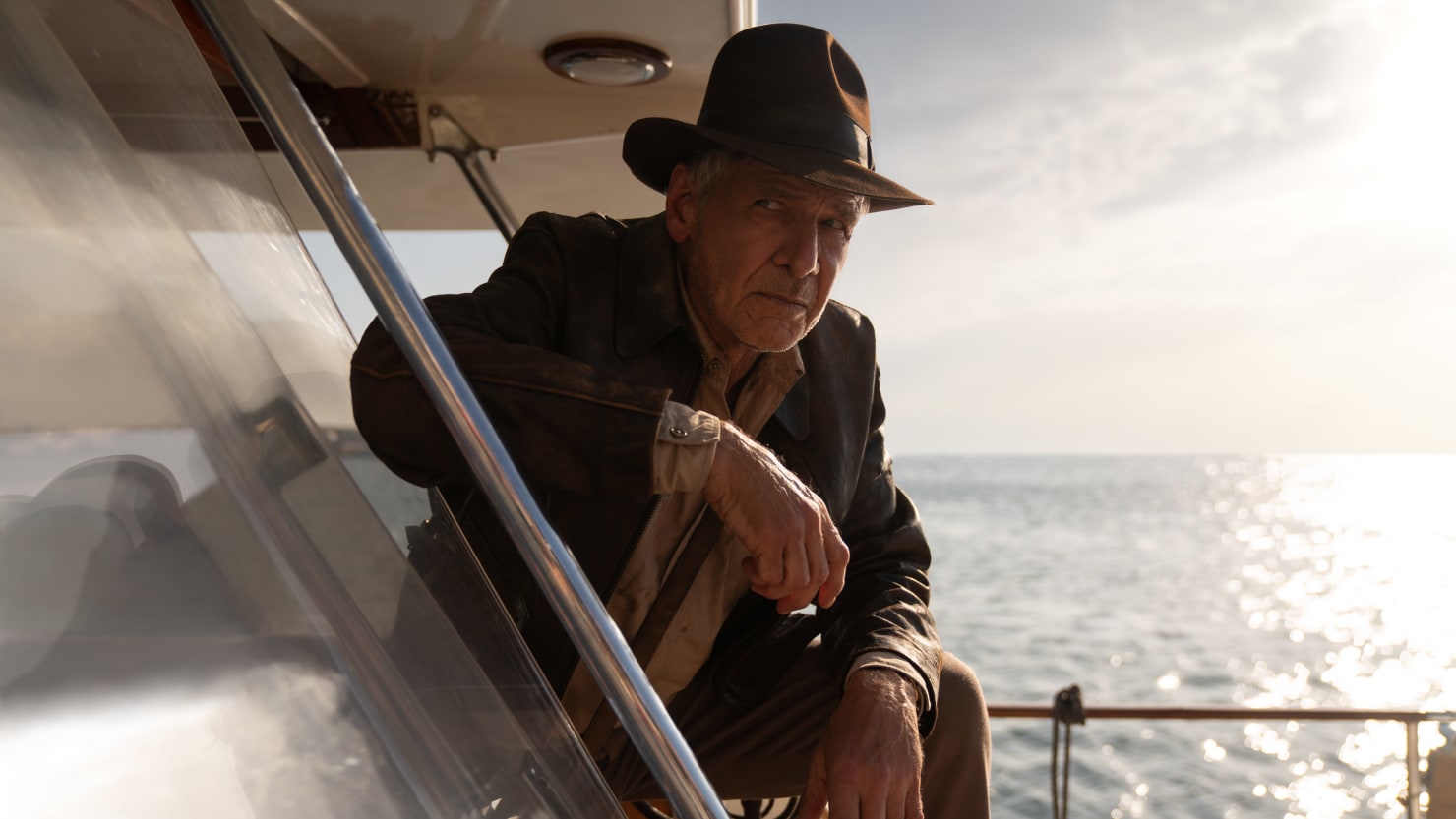TIME WARP
While perfectly serviceable, the new Indy movie thwarts the opportunity to show what an 80-year-old hero would really be like, desperate to turn back the clock instead.
CANNES, France—The first image of Harrison Ford in Indiana Jones and the Dial of Destiny is a disorienting one. It’s 1945, the war is just about done, and a group of Nazis are trying to squirrel away stolen antiquities. They have captured an interloper and covered his head with a sack. When his face is revealed, sure enough, it’s Indiana Jones, but he’s disconcertingly de-aged. His face is too smooth. His eyes are too bright. When he speaks, it doesn’t sound like the words are really coming out of his mouth. This might as well be called Indiana Jones and the Uncanny Valley.
The de-aging mostly goes away after the 20-minute opening sequence, when the action jumps forward to 1969. But, during a screening at the Cannes Film Festival, I found myself mostly wishing that it would just let Harrison Ford be an old man.
Ford is 80 and while James Mangold’s movie occasionally acknowledges that Indy has seen some shit, it also mostly ignores the physical realities of what an 80-year-old body can do. Old Indy jumps on a police horse and barrels through the New York City subway system. He punches too many people to count. He scales structures and deep sea dives. I could only think, man, that must be painful.
The film eventually comes around to reckoning with Ford and Indy’s age, but it’s too little too late, even though it all ends on a truly lovely grace note. The de-aging and other CGI manipulations of Ford’s body only serve to demonstrate that Dial of Destiny just wants to turn back the clock instead of doing anything new.
That’s fitting in some ways because the MacGuffin this time around is all about time travel. The eponymous “dial of destiny” is the “Antikythera,” an invention created by Archimedes that can supposedly create fissures in time. It’s an object of obsession for Jürgen Voller (Mads Mikkelsen, sleepwalking through yet another villain role), a Nazi mathematician currently working for the U.S. space program. (This historically accurate detail is mostly just tossed off rather than actually figuring into the plot.)
Indy gets involved when his goddaughter Helena Shaw (Phoebe Waller-Bridge, delightful as always) visits him in New York proclaiming her desire to continue the research of her father Basil (Toby Jones). Basil entrusted Indy with half the dial hoping he would destroy it, but our hero, always a lover of artifacts, instead just kept it hidden. Helena, no surprise, is not exactly who she says she is—though still, ultimately, an ally—and when she absconds with the device, she kicks off a trek around the world that includes stops in Morocco and Italy. (I always get a little thrill when a map engulfs the screen showing the path of the adventure.)
The screenplay, credited to Mangold as well as David Koepp, Jez Butterworth, and John-Henry Butterworth, mostly serves as filler to bounce from chase sequence to chase sequence. Eventually, Indy and Helena are joined by Teddy (Ethann Isidore), a cute kid who feels like the writers’ attempts to infuse the material with some Short Round energy.
When we meet Indy in 1969, he’s a morose grump. His son has died—an easy way of disposing of Mutt Williams, the Shia LaBeouf character from Kingdom of the Crystal Skull—and his wife Marion Ravenwood (Karen Allen) has filed for divorce. He’s yelling at his hippie neighbors and retiring from teaching. Instead of lusting after him, as they did in Raiders of the Lost Ark, his students are now just bored.
But as soon as the action gets underway it seems that Mangold forgets the cantankerous, sorrow-filled aspects of this aged Indy, and instead tries to fit him in the mold of the guy we once knew—noble and sarcastic with that seductive winking wry humor. It feels like a missed opportunity to actually grapple with an Indy that has weathered those years, and means the big swan song-style climax doesn't really have the impact for which it is clearly aiming.
Mostly, the Dial of Destiny is just serviceable, doing everything exactly as well as it needs to and nothing more. Though Mangold is a talented director known for the likes of Logan and Ford v Ferrari, he’s also no Steven Spielberg. The compositions are clean and well done but nothing special. (Make fun of Kingdom of the Crystal Skull all you want, at least it’s trying something.)
Maybe unintentionally, Indiana Jones and the Dial of Destiny made me a little depressed. Not because of its narrative—the last beat is actually very sweet—but because of the way it hangs onto a moment that has long passed. Technology can now ensure our stars will be forced to recreate their glory days, and I don't really want to see that. I want them to evolve. Harrison Ford is not the Indiana Jones of Raiders and he shouldn’t have to be.
Like this review? Sign up to get our weekly See Skip newsletter every Tuesday and find out what new shows and movies are worth watching and which aren’t.
Got a tip? Send it to The Daily Beast here.
